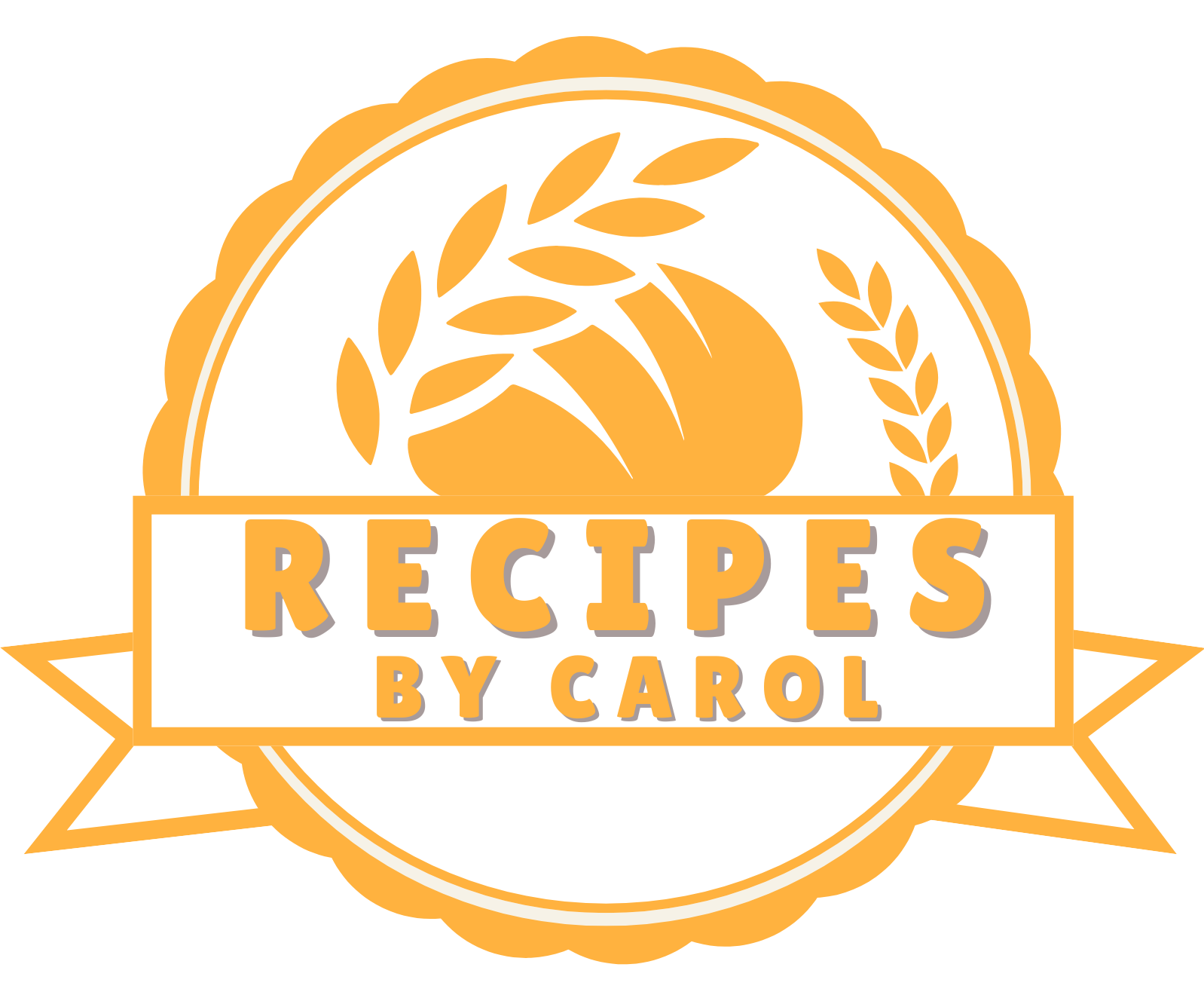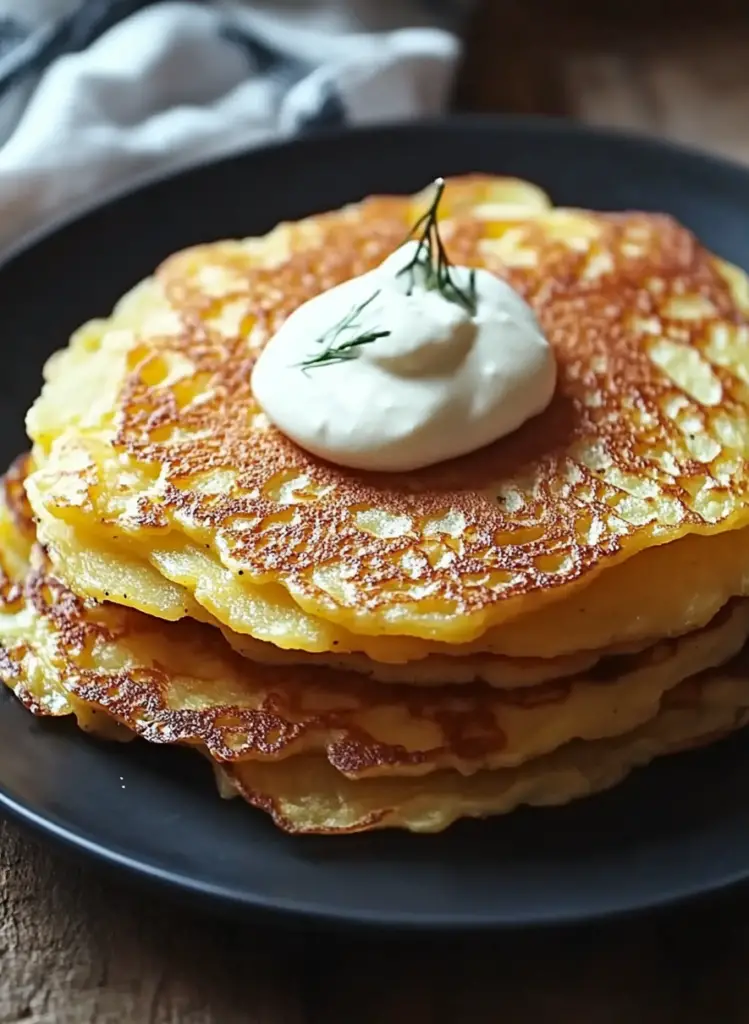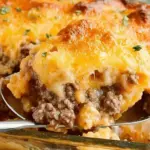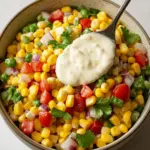German Potato Pancakes, or Reibekuchen, are a beloved dish known for their crispy exterior and tender interior. Traditionally served with sour cream or applesauce, they strike a delightful balance between savory and sweet. A staple of German Christmas markets and family kitchens, these pancakes are quick to prepare, versatile, and perfect for any occasion.
Ingredients:
- 4 large potatoes, peeled and grated
- 1 small onion, finely grated
- 1 large egg
- 1/4 cup all-purpose flour
- 1 teaspoon salt
- 1/4 teaspoon black pepper
- 2 tablespoons vegetable oil (for frying)
- Optional: sour cream or applesauce for serving
Directions:
- Grate the potatoes and onion using a box grater or food processor. Place the grated potatoes in a clean dish towel or cheesecloth and squeeze out excess moisture.
- In a large bowl, combine the grated potatoes and onion with the egg, flour, salt, and pepper. Mix well until all ingredients are fully incorporated.
- Heat vegetable oil in a large skillet over medium heat.
- Scoop about 2 tablespoons of the potato mixture, flatten it into a pancake shape, and carefully place it in the hot skillet.
- Fry the pancakes for 3-4 minutes on each side, or until golden brown and crispy. Cook in batches to avoid overcrowding the skillet.
- Transfer the cooked pancakes to a paper towel-lined plate to drain excess oil.
- Serve immediately with sour cream or applesauce.
Nutrients:
- Calories: 180 kcal per serving
- Prep Time: 15 minutes
- Cooking Time: 20 minutes
- Total Time: 35 minutes
- Servings: 4 servings
Enjoy the rich tradition and flavor of these classic German Potato Pancakes!
German Potato Pancakes (Reibekuchen): A Culinary Tradition
German Potato Pancakes, known as Reibekuchen, are more than just a meal—they are a connection to Germany’s rich culinary heritage. Known for their crispy exterior and tender interior, these pancakes are a beloved staple at Christmas markets, family gatherings, and casual dinners across Germany. Served with sour cream or applesauce, they strike a perfect balance between savory and sweet, making them a versatile dish suitable for a variety of occasions.
The Cultural Significance of Reibekuchen
Reibekuchen have deep roots in German culture, often associated with comfort and tradition. The dish is a favorite during the colder months, particularly at Christmas markets, where the aroma of freshly fried pancakes fills the air. These markets, or Weihnachtsmärkte, are a quintessential part of German holiday festivities, featuring stalls selling everything from handcrafted ornaments to hearty dishes like Reibekuchen.
In German households, Reibekuchen is a nostalgic dish, often prepared by grandparents and passed down through generations. It’s a reminder of simpler times when meals were crafted from basic, affordable ingredients but delivered maximum satisfaction. For many, biting into a warm, crispy pancake is like tasting a piece of their childhood.
Versatility of Reibekuchen: More Than Just a Snack
While Reibekuchen are traditionally served as a standalone snack or light meal, their versatility makes them an excellent accompaniment to a variety of dishes. For a savory twist, they pair wonderfully with smoked salmon, crème fraîche, or even a poached egg. Sweet lovers can enjoy them with a dollop of applesauce, a sprinkling of cinnamon, or a drizzle of honey.
The dish is also adaptable to dietary preferences and regional variations. In southern Germany, for example, you might find versions incorporating grated zucchini or carrots for added flavor and nutrition. Meanwhile, modern spins on Reibekuchen can include gluten-free flours or vegan substitutes for the egg, making it accessible to a wider audience.
Tips for the Perfect German Potato Pancakes
Creating the ideal Reibekuchen requires a few simple techniques to ensure they turn out crispy, golden, and delicious. Here are some expert tips:
- Choosing the Right Potatoes
Starchy potatoes, such as Russets, are best for Reibekuchen because they yield a crispier pancake. The starch helps bind the mixture together, ensuring it holds its shape during frying. - Draining Excess Moisture
Grated potatoes can release a lot of water, which can make the pancakes soggy. Squeezing out as much moisture as possible using a clean dish towel or cheesecloth is crucial for achieving the desired crispiness. - Balancing Flavors
The inclusion of finely grated onion adds a subtle sweetness and depth of flavor to the pancakes. Seasoning with salt and pepper brings out the natural taste of the potatoes without overwhelming the dish. - Controlling Heat During Frying
Maintaining the right oil temperature is key. If the oil is too hot, the pancakes can burn on the outside while remaining undercooked inside. Too cool, and they may absorb excess oil, making them greasy. Medium heat ensures even cooking and a perfect golden crust. - Working in Batches
Overcrowding the skillet can lower the oil temperature and result in unevenly cooked pancakes. Frying in small batches gives each pancake enough space to crisp up beautifully. - Serving Fresh
Reibekuchen are best enjoyed fresh off the skillet when they’re still warm and crispy. If preparing a large batch, keep them warm in a low-temperature oven until ready to serve.
Health Considerations and Nutritional Value
While Reibekuchen are undeniably indulgent, they can be part of a balanced diet when consumed in moderation. A serving provides around 180 calories, making them a satisfying snack or light meal. The combination of potatoes and onions offers dietary fiber, vitamin C, and antioxidants, while the egg adds a touch of protein.
For those seeking healthier alternatives, you can experiment with baking the pancakes instead of frying them. Using an air fryer is another great option that delivers the same crispy texture with significantly less oil.
Reibekuchen Around the World
The concept of grated potato pancakes isn’t unique to Germany. Variations can be found in many cuisines worldwide, highlighting the universal appeal of this simple yet satisfying dish.
- In Poland, placki ziemniaczane are a popular comfort food, often served with sour cream or mushroom sauce.
- Jewish cuisine features latkes, traditionally made during Hanukkah, which are remarkably similar to Reibekuchen but often include matzo meal instead of flour.
- Swiss Rösti is another close cousin, though it usually omits the binding agents like egg or flour and focuses solely on potatoes.
These global interpretations underscore the adaptability of the humble potato pancake, allowing each culture to infuse it with its unique flavors and traditions.
Conclusion: A Dish That Stands the Test of Time
German Potato Pancakes, or Reibekuchen, are more than just a recipe—they’re a celebration of tradition, simplicity, and flavor. Whether served as a festive treat at a bustling Christmas market or as a comforting meal at home, these pancakes bring joy to anyone who tastes them. Their versatility makes them a favorite for all occasions, while their crispy texture and savory-sweet flavor ensure they’re always a crowd-pleaser.
In a world that often moves too fast, Reibekuchen remind us of the beauty in slowing down and savoring life’s simple pleasures. They’re a testament to the enduring appeal of traditional recipes, proving that even the most basic ingredients can create something extraordinary. Whether you’re an experienced cook or a kitchen novice, making Reibekuchen is a journey worth taking—one bite, and you’ll understand why this dish has stood the test of time.







